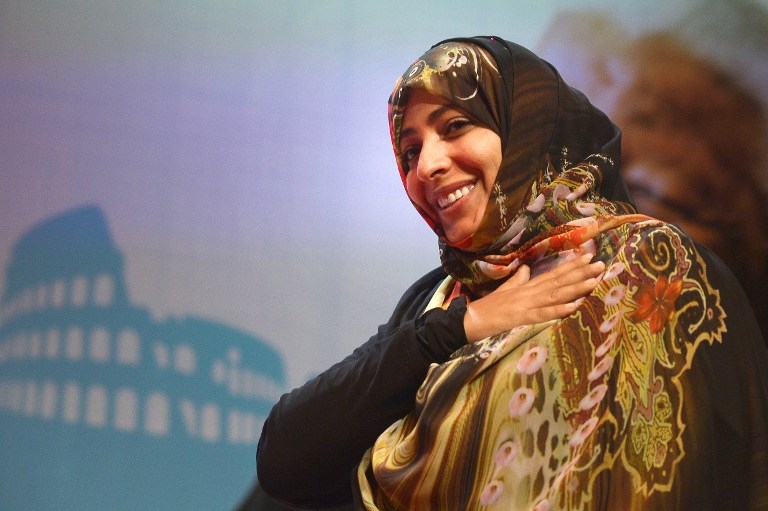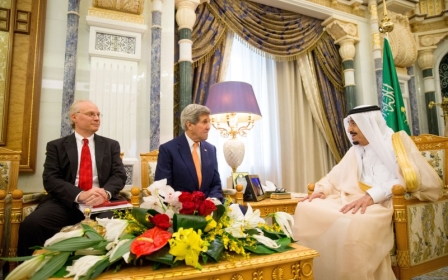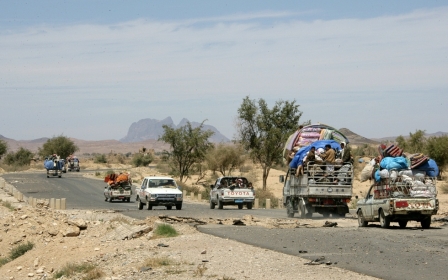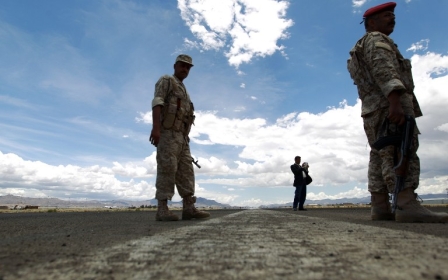MEE INTERVIEW: Yemen's 'mother of the revolution' on the way forward

Tawakkol Karman, once known to many as the Mother of Yemen’s Revolution, rose to prominence during the 2011 uprising that ousted President Ali Abdullah Saleh. Her active role in Yemen’s Arab Spring, as leader of a key youth movement, earned her the Nobel Peace Prize in 2011.
Four years on, and the political landscape in Yemen is transformed, with the post-revolution president forced into exile by Houthi rebels, with backing from Saleh. Karman, not for the first time, has earned death threats after taking the controversial step of backing the Saudi-led airstrikes that have pounded the Houthis for over six weeks. Now, she speaks to Middle East Eye from her exile about the fate of Yemen’s uprising and what a potential recovery could look like.
MEE: When you were in Change Square in 2011, did you imagine something like this happening?
TK: I was expecting we would face many difficulties due to the nature of the clan-based and tribal system whose downfall we took to the streets to bring about. However, no one ever expected that things would reach the situation we are in today.
Four years ago our demands were, and still are, simple and straightforward. We want democracy and peace. We wanted to live in a democratic Yemen that is inclusive for all, that establishes the state of rule and law and in which the state monopolises the right to possess weapons and alone has sovereignty.
We almost achieved that by means of an inclusive national dialogue that lasted for three years and that involved all active elements within Yemen including the Houthis themselves. We managed to arrive at a deal over a document for building the new state and we were about to conduct a referendum about the proposed draft constitution, one that secures rights and liberties and guarantees all the ambitions of the modern state. The draft constitution was the product of the national dialogue in which all parties took part and which was agreed upon by all including the Houthis. However, the Houthi militias and the deposed (president) Saleh, with unlimited support from Iran, carried out a coup and turned the table on everything we agreed on. They imposed house arrest on the legitimate president, the prime minister and the cabinet members. Then, they went on occupying cities and violating rights and liberties in blatant breech of the gains acquired during the peaceful February revolution and of everything we had agreed upon.
MEE: As a winner of the Nobel Peace Prize, how does it make you feel witnessing the violence going on in your country?
TK: I feel deep sorrow and enormous pain. However, I am confident that our people will put an end to this unjustifiable violence and that they will impose peace and democracy and will proceed forward along the path of establishing them notwithstanding all the difficulties. This is our dream. We cherish sufficient dreams, aspiration, hope and moral commitment so as to be able to achieve this without doubt.
I call for the implementation of what was agreed upon during the national dialogue far away from the use of violence, triumphalism, oppression and compulsion.
We seek a state that has a monopoly over the possession and use of weapons and political groups that do not use violence or resort to force in order to achieve their objectives. This is exactly what we agreed on during the national dialogue that lasted for a year and that was testified to and hailed by the entire world.
MEE: Where are you now? When will you return to Yemen and is it safe for you to go back?
TK: At the moment I am outside Yemen. I was blacklisted and banned from entering Yemen or from leaving it by the Houthi militias and deposed president Saleh after they seized all public institutions. But I am struggling together with the rest of our people in order to restore democracy and peace. I am in constant communication with the political and youth components and am working with them for the accomplishment of this noble goal.
As for my return to Yemen and whether this is a safe option, I can tell you that my return to Yemen is fraught with dangers. The Houthi militias and those of deposed Saleh have spread death in every corner of Yemen. They have turned the country into a huge prison that is full of murder, torture and banishment. However, this will not cause us to lose hope that eventually peace, democracy, freedom and justice will prevail. To the contrary, it makes us more resolute to accomplish this.
MEE: In 2012 you sat with the Houthis in the National Dialogue. Do you regret that they were included? Is dialogue with the Houthis still possible now?
TK : No! I cannot regret something like that. We called on them to join the peaceful revolution in 2011. We invited them to dialogue and we sat with them around one table together with various components of the Yemeni people. I sat on the highest committee that prepared for dialogue and then sat on the highest committee in charge of reconciling the parties in the dialogue including the Houthis. This is our peaceful revolution, which came in order to encompass everyone and involve everyone in outlining the features of the future of the new Yemen. We agreed on the outcomes of the national dialogue conference and were just meters away from crossing into the future. It was the coup by the Houthi militias and deposed Saleh that stopped everything.
I cannot anticipate anything regarding the Houthis so long as they continue to act contrary to what they proclaim. The militias must exit the towns and should be disarmed. They should transform into a political body. These steps are important and they are among the things we had agreed upon and signed on together with the Houthis. If adopted, these steps could build confidence between the Houthis and the rest of the Yemenis.
Once they do that we shall defend their right to political participation and we would never agree to their exclusion.
MEE: The Houthis have been committing atrocities across the country. Many have also been killed by the airstrikes and much of Yemen’s critical infrastructure damaged. Are you concerned by this?
TK: I am rather concerned. I call on all warring parties to abide by international humanitarian law and to spare civilians, especially women and children, the woes of war. I should note that failing to do so will not be forgiven by humanitarian law and will be regarded as crimes that do not lapse with the passage of time.
What is going on at the moment in Yemen is that the Houthi militias that are allied with the deposed president Ali Saleh and that are supported by Iran, occupy the capital and several Yemeni provinces. They expelled the president, the cabinet and the interim authority that were chosen to lead the process of transition. They have violated all the basic rights and freedoms of citizens. They have been embroiled in murder, kidnap, and overall persecution. They have destroyed homes and banished hundreds of thousands of citizens. There is also an Arab intervention upon the request of President Hadi and the government. There is popular resistance against the militias as well as troops loyal to President Hadi. This is what is going on in Yemen right now. So, what to do?
No one needs war or violence. I always talk about a comprehensive solution comprised of a ceasefire and an end to violence simultaneously with an implementation of the outcomes of the national dialogue conference, foremost among which:
· the withdrawal of the Houthi militias from towns and cities and handing over their weapons to the provisional authority that is elected by the people and represented by President Hadi and the government of Prime Minister Khalid Bahah, which had previously been agreed upon with the Houthis;
· the transformation of the militias into a political party;
· the holding of a referendum over the constitution that was drafted in accordance with the outcomes of the national dialogue that had already been agreed upon;
· the holding of elections in accordance with the new constitution
· the cleansing of the collective national memory by means of a genuine national reconciliation underpinned by the principles of a genuine transitional justice in accordance with international standards.
This is rather important for the restoration of democracy and building a permanent peace process in Yemen. Eventually, we have to decide whether we want to remain in a constant war or we should end the violence and build peace. Certainly, our people will favour an end to violence and building peace and democracy.
MEE: Many figures from your party, the Islah, are in exile, in jail or in hiding. How will the Islah make a comeback?
TK: It is true that Islah is being subjected to persecution at the hands of the Houthis but so too are the youth of the peaceful revolution of all inclinations and parties. They are subjected to kidnapping and murder. However, such persecution and oppressive measures cannot destroy a large political party that has long experience and huge popularity. What applies to Islah applies to the others too. They will not be brought to their knees by the persecution exacted on them by the Houthi militias. When the political process is resumed soon, everyone will return including the Islah Party. Then, there will be no detainees or kidnapped persons.
MEE: Can this conflict be resolved militarily? What would a political solution to the conflict look like?
TK: As I said before, we do not want war and we do not want violence. Democracy and peace are our dreams and are our choices.
We shall endeavour to arrive at a solution that ends the war. As I said before, it is my belief that such a solution should fulfil a number of requirements so as to be permanent and fruitful. The legitimate authority, which was agreed upon, should be reinstated so as to manage the process of transition. This authority is represented by President Hadi and the government of Khalid Bahah. It should be enabled to exercise its powers and carry out its mission in all institutions, facilities and territories within Yemen. It should be allowed to implement the outcomes of the dialogue. The militias should hand over all their weapons to the state so that it alone has the exclusive right to possessing weapons and to undertake whatever is necessary of measures to prevent the delivery of weapons to any party within Yemen except for the state itself. There has to be a referendum over the constitution. Then elections will have to be held and this would stipulate the transformation of the militias into political parties so as to be able to take part in the democratic process. In the meantime there would have to be a reconstruction and development project similar to the Marshal Project that was implemented for the reconstruction of Germany in the wake of the Second World War.
In addition to all of this, education should be given utmost priority. In my humble opinion, education represents a guarantee for putting an end to ignorance, extremism and violence.
MEE: Do you think the atmosphere has changed in Yemen? Could it go back to what it was before?
TK: Certainly. It will go back to what it was before. This is our hope and dream and this is what we endeavour to accomplish. No matter how much killing and violence takes place, I am sure that our people will make peace and establish democracy. I would bet on that and I promise you it will happen. If you have time to read history, you will discover that the Yemeni people hate extremism and love life and loves defying obstacles and hardships. The Yemeni people will not fall and will not be destroyed.
New MEE newsletter: Jerusalem Dispatch
Sign up to get the latest insights and analysis on Israel-Palestine, alongside Turkey Unpacked and other MEE newsletters
Middle East Eye delivers independent and unrivalled coverage and analysis of the Middle East, North Africa and beyond. To learn more about republishing this content and the associated fees, please fill out this form. More about MEE can be found here.




